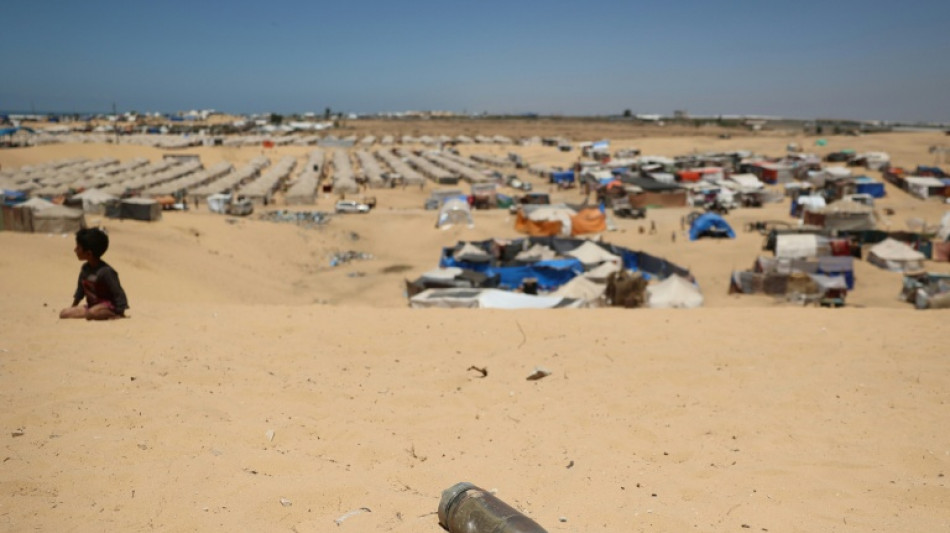
-
 Trump defiant as tariffs send world markets into panic
Trump defiant as tariffs send world markets into panic
-
City officials vote to repair roof on home of MLB Rays
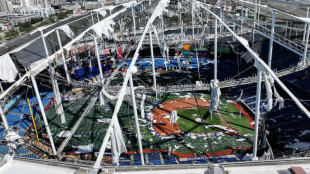
-
 Rockets forward Brooks gets one-game NBA ban for technicals
Rockets forward Brooks gets one-game NBA ban for technicals
-
Pentagon watchdog to probe defense chief over Signal chat row

-
 US tariffs could push up inflation, slow growth: Fed official
US tariffs could push up inflation, slow growth: Fed official
-
New Bruce Springsteen music set for June 27 release

-
 Tom Cruise pays tribute to Val Kilmer
Tom Cruise pays tribute to Val Kilmer
-
Mexico president welcomes being left off Trump's tariffs list

-
 Zuckerberg repeats Trump visits in bid to settle antitrust case
Zuckerberg repeats Trump visits in bid to settle antitrust case
-
US fencer disqualified for not facing transgender rival

-
 'Everyone worried' by Trump tariffs in France's champagne region
'Everyone worried' by Trump tariffs in France's champagne region
-
Italy's Brignone suffers broken leg with Winter Olympics looming

-
 Iyer blitz powers Kolkata to big IPL win over Hyderabad
Iyer blitz powers Kolkata to big IPL win over Hyderabad
-
Russian soprano Netrebko to return to London's Royal Opera House

-
 French creche worker gets 25 years for killing baby with drain cleaner
French creche worker gets 25 years for killing baby with drain cleaner
-
UK avoids worst US tariffs post-Brexit, but no celebrations

-
 Canada imposing 25% tariff on some US auto imports
Canada imposing 25% tariff on some US auto imports
-
Ruud wants 'fair share' of Grand Slam revenue for players

-
 Lesotho, Africa's 'kingdom in the sky' jolted by Trump
Lesotho, Africa's 'kingdom in the sky' jolted by Trump
-
Trump's trade math baffles economists

-
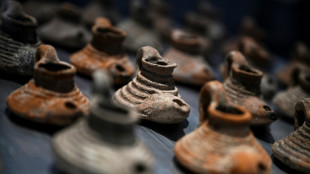 Gaza heritage and destruction on display in Paris
Gaza heritage and destruction on display in Paris
-
'Unprecedented crisis' in Africa healthcare: report

-
 Pogacar gunning for blood and thunder in Tour of Flanders
Pogacar gunning for blood and thunder in Tour of Flanders
-
Macron calls for suspension of investment in US until tariffs clarified

-
 Wall St leads rout as world reels from Trump tariffs
Wall St leads rout as world reels from Trump tariffs
-
Mullins gets perfect National boost with remarkable four-timer

-
 Trump tariffs hammer global stocks, dollar and oil
Trump tariffs hammer global stocks, dollar and oil
-
Authors hold London protest against Meta for 'stealing' work to train AI

-
 Tate Modern gifted 'extraordinary' work by US artist Joan Mitchell
Tate Modern gifted 'extraordinary' work by US artist Joan Mitchell
-
Mexico president welcomes being left off Trump's new tariffs list

-
 Tonali eager to lead Newcastle back into Champions League
Tonali eager to lead Newcastle back into Champions League
-
Lesotho hardest hit as new US tariffs rattle Africa
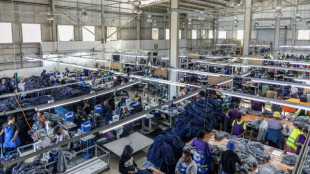
-
 Stellantis pausing some Canada, Mexico production over Trump auto tariffs
Stellantis pausing some Canada, Mexico production over Trump auto tariffs
-
Rising odds asteroid that briefly threatened Earth will hit Moon

-
 Italy reels from Brignone broken leg with Winter Olympics looming
Italy reels from Brignone broken leg with Winter Olympics looming
-
Is the Switch 2 worth the price? Reviews are mixed

-
 Ancelotti’s tax trial wraps up in Spain with prosecutors seeking jail
Ancelotti’s tax trial wraps up in Spain with prosecutors seeking jail
-
Civilians act to bring aid to Myanmar earthquake victims

-
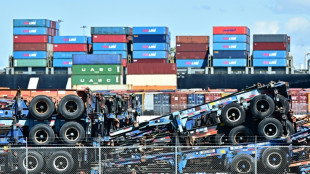 US trade gap narrows in February ahead of bulk of Trump tariffs
US trade gap narrows in February ahead of bulk of Trump tariffs
-
Stocks, dollar and oil sink as gold hits high on Trump tariffs

-
 Countries eye trade talks as Trump tariff blitz roils markets
Countries eye trade talks as Trump tariff blitz roils markets
-
Arsenal defender Gabriel out for rest of the season

-
 Trump says US to emerge 'stronger' as markets tumble over tariffs
Trump says US to emerge 'stronger' as markets tumble over tariffs
-
Wiegman says Belgium games can aid England's women's Euros title defence

-
 Prosecutors demand jail term for Ancelotti for tax fraud
Prosecutors demand jail term for Ancelotti for tax fraud
-
Syria accuses Israel of deadly destabilisation campaign

-
 Skiing World Cup champion Brignone suffers broken leg
Skiing World Cup champion Brignone suffers broken leg
-
Iconic Paris hotel Lutetia taken over by Mandarin Oriental

-
 Nepal capital chokes as wildfires rage
Nepal capital chokes as wildfires rage
-
AI could impact 40 percent of jobs worldwide: UN


Shiny and deadly, unexploded munitions a threat to Gaza children
War has left Gaza littered with unexploded bombs that will take years to clear, with children drawn to metal casings maimed or even killed when they try to pick them up, a demining expert said.
Nicholas Orr, a former UK military deminer, told AFP after a mission to the war-battered Palestinian territory that "we're losing two people a day to UXO (unexploded ordnance) at the moment."
According to Orr, most of the casualties are children out of school desperate for something to do, searching through the rubble of bombed-out buildings sometimes for lack of better playthings.
"They're bored, they're running around, they find something curious, they play with it, and that's the end," he said.
Among the victims was 15-year-old Ahmed Azzam, who lost his leg to an explosive left in the rubble as he returned to his home in the southern city of Rafah after months of displacement.
"We were inspecting the remains of our home and there was a suspicious object in the rubble," Azzam told AFP.
"I didn't know it was explosive, but suddenly it detonated," he said, causing "severe wounds to both my legs, which led to the amputation of one of them."
He was one of hundreds of thousands of Palestinians returning home during a truce that brought short-lived calm to Gaza after more than 15 months of war, before Israel resumed its bombardment and military operations last month.
For Azzam and other children, the return was marred by the dangers of leftover explosives.
- 'Attractive to kids' -
Demining expert Orr, who was in Gaza for charity Handicap International, said that while no one is safe from the threat posed by unexploded munitions, children are especially vulnerable.
Some ordnance is like "gold to look at, so they're quite attractive to kids", he said.
"You pick that up and that detonates. That's you and your family gone, and the rest of your building."
Another common scenario involved people back from displacement, said Orr, giving an example of "a father of a family who's moved back to his home to reclaim his life, and finds that there's UXO in his garden".
"So he tries to help himself and help his family by moving the UXO, and there's an accident."
With fighting ongoing and humanitarian access limited, little data is available, but in January the UN Mine Action Service said that "between five and 10 percent" of weapons fired into Gaza failed to detonate.
It could take 14 years to make the coastal territory safe from unexploded bombs, the UN agency said.
Alexandra Saieh, head of advocacy for Save The Children, said unexploded ordnance is a common sight in the Gaza Strip, where her charity operates.
"When our teams go on field they see UXOs all the time. Gaza is littered with them," she said.
- 'Numbers game' -
For children who lose limbs from blasts, "the situation is catastrophic", said Saieh, because "child amputees require specialised long-term care... that's just not available in Gaza".
In early March, just before the ceasefire collapsed, Israel blocked all aid from entering Gaza. That included prosthetics that could have helped avoid long-term mobility loss, Saieh said.
Unexploded ordnance comes in various forms, Orr said. In Gaza's north, where ground battles raged for months, there are things like "mortars, grenades, and a lot of bullets".
In Rafah, where air strikes were more intense than ground combat, "it's artillery projectiles, it's airdrop projectiles", which can often weigh dozens of kilograms, he added.
Orr said he was unable to obtain permission to conduct bomb disposal in Gaza, as Israeli aerial surveillance could have mistaken him for a militant attempting to repurpose unexploded ordnance into weapons.
He also said that while awareness-raising could help Gazans manage the threat, the message doesn't always travel fast enough.
"People see each other moving it and think, 'Oh, they've done it, I can get away with it,'" Orr said, warning that it was difficult for a layperson to know which bombs might still explode, insisting it was not worth the risk.
"You're just playing against the odds, it's a numbers game."
F.Bennett--AMWN